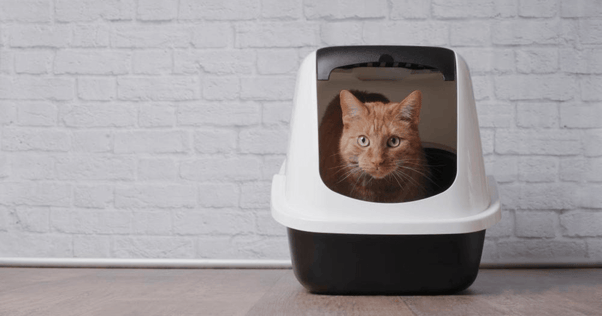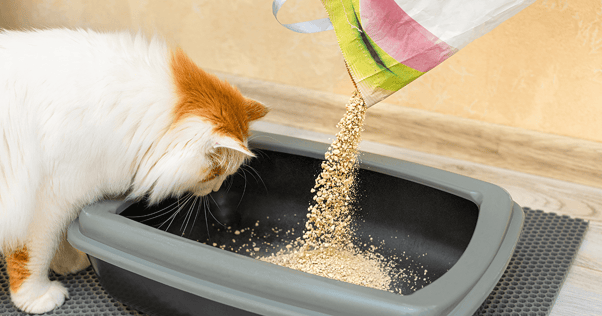Why Do Cats Spray? 5 Reasons for Cat Spraying
Does your cat sometimes urinate outside of their litterbox?
Cats are usually such clean and careful creatures, so if your pet has started to spray somewhere away from their normal spot - such as against a wall, door, furniture, or on another vertical surface - they may be trying to communicate something. Of course, this knowledge doesn’t make it any less unpleasant when your cat is spraying around your home!
With all this in mind, you’re probably looking for tips on how to stop this behaviour. But first, we’d suggest that it may be more beneficial to understand why cats spray in the first place. This helps us to recognise what’s changed in our cats’ lives and resolve any underlying causes. So, keep reading for our expert tips!
Why Do Cats Spray?

1. Illness
If your kitty seems to be messing accidentally or has suddenly changed their behaviour, it’s a good idea to check that nothing’s wrong with their health. Sometimes cats urinate in different places due to an underlying health or medical condition, such as cystitis. This is no fun for your pet! Arthritis or age can also create discomfort and cause your cat to urinate outside the litter box. So, if you notice anything unusual, it’s important to get your furry friend checked by the vet to rule out any medical issues.
2. Kitty Litter Box Preferences
Does your kitty dislike or have trouble with their litter box? Try to investigate whether this might be the cause behind your cat peeing elsewhere. For example:
- Is the litter box clean enough? We all prefer to use a clean toilet, and cats are no different! If their litter box is not as clean as they like then, they might not use it.
- Is the litter box always in a room that is accessible to your cat? They need easy access at all times - and won’t just ‘hold it’ if they need to go and can’t get into it.
- Is the litter box too high up? This might make it difficult for your pet to access, particularly if you have a more senior cat.
- Is the litter box in a quiet spot? Cats can feel vulnerable while toileting so it’s best to avoid areas where noises can happen, such as near washing machines.
- Have you tried a different type of litter? Sometimes, the answer to why cats avoid a litter box is as simple as your kitty’s preferences! They may dislike the litter you’ve chosen, so try using a different type to encourage them to use the litter box.

3. Limited Litter Boxes
How many litter boxes do you have in your house? If you have multiple cats, you might not have enough. This could then be prompting your cats to urinate elsewhere. As a helpful tip, it’s best to have one more litter box than the number of cats in the house. And make sure to have them all in separate places, rather than all together. Otherwise, this is just one large litter box in the mind of cats!
If one of your fur-babies are a little on the shy side, make sure they have easy access to their own litter box. This should be somewhere quiet and out of the way where your cat won’t be interrupted.
4. Stress or Unhappiness
Like a lot of humans, cats also like to feel in charge! If they’re not feeling completely happy, or are facing any stress or anxiety, this can explain why cats spray. They’ll leave urine marks to help them feel safer in that particular place. Essentially, spraying may be due to a change in your cat’s routine or lifestyle. Your furry pal is a creature of habit and doesn’t like change!
If you think stress might be the cause, try to identify what’s making your cat feel unhappy. For example, there might be a scary neighbour cat outside the window, so shutting blinds or windows would stop your cat feeling intimidated. Another cause might also be a change in your family or in the home, such as redecoration or celebrations, or even the presence of new furniture.
5. Scent Habits
If your cat has developed a habit of urine spraying in a particular spot, the scent could be attracting them back for a repeat spray. To discourage this habit, you should clean the area where your cat has urinated with a simple soap and water, or use a recommended urine stain and odour remover. Don’t use ammonia-based or bleach cleaners as this will attract your cat back to pee again.
How To Stop Cats Spraying
If you’ve ruled out illness and other stress factors, the best way to stop a cat from spraying is to provide your cat with a calming and comforting environment. FELIWAY Optimum is clinically proven to comfort cats at home and decrease urine spraying. This is the ideal solution to help your cat feel secure in their environment, making both you and your cat happier! For the best results, plug the diffuser into a socket in the area your cat spends most of their time.
You can also consider using FELIWAY Classic Spray if your cat keeps spraying in one single place. This should be sprayed on the area at least once daily after the area has been cleaned. Remember, making your kitty feel comfortable in your home will help to reduce them from spraying from stress and limit any signals, including spraying, as well as bring you both closer together. For more information on creating a cat-friendly home, check out our article here.
Are you looking for more tips on stopping cats from spraying or are interested in learning more about recognizing the signs of stress in cats? Get in touch! We’d love to hear from you and share all the advice we can. You can also stay informed with our latest tips and FELIWAY product advice by signing up to our newsletter.
